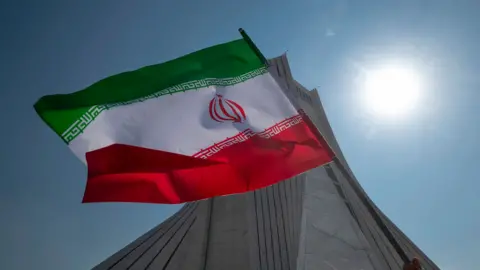BBC diplomatic correspondent
 NurPhoto via Getty Images
NurPhoto via Getty ImagesThe UK faces a “rising” and unpredictable threat from Iran and the government must do more to counter it, Parliament’s intelligence and security committee has warned.
The call comes as it publishes the results of a major inquiry which examined Iranian state assassinations and kidnap, espionage, cyber attacks and the country’s nuclear programme.
The report took evidence up to August 2023 so does not assess developments in the aftermath of the 7 October attack, but its authors say the findings remain relevant.
The committee, which is tasked with overseeing Britain’s spy agencies, raised particular concern over the “sharp increase” in physical threats against opponents of Iran’s regime in the UK.
“Iran poses a wide-ranging, persistent and unpredictable threat to the UK, UK nationals and UK interests,” said Lord Beamish, committee chair.
“Iran has a high appetite for risk when conducting offensive activity and its intelligence services are ferociously well-resourced with significant areas of asymmetric strength.”
He added: “Iran is there across the full spectrum of all the kinds of threats we have to be concerned with.”
The committee accuses the government of focusing on “crisis management” and “fire-fighting” with Iran, as well as on its nuclear programme, at the expense of other threats.
It says the national security threat from Iran requires more resourcing and a longer-term approach.
“Whilst Iran’s activity appears to be less strategic and on a smaller scale than Russia and China, Iran poses a wide-ranging threat to UK national security, which should not be underestimated: it is persistent and – crucially – unpredictable.”
It says it was told by intelligence bodies that, in terms of the threat to the UK, Iran “would be top of the Championship rather than the Premier League, but rising”.
On the physical threat to people living in the UK, the committee said it has significantly increased in pace and in number since the start of 2022.
It is focused at dissidents and other opponents of the Iranian regime, it said, adding there is also an increased threat “against Jewish and Israeli interests in the UK”.
There have been at least 15 attempts at murder or kidnap against British nationals or UK-based individuals since the beginning of 2022, the report found.
“The Homeland Security Group told us that the threat of physical attack on individuals in the UK is now ‘the greatest level of threat we currently face from Iran’, and comparable with the threat posed by Russia.”
But, the committee said, Iran does not view attacks on dissident, Jewish and Israeli targets in the UK as attacks on the UK. The report continues: “It rather sees the UK as collateral in its handling of internal matters – i.e. removing perceived enemies of the regime – on UK soil”.
The Home Secretary and MI5 explained to the committee that the rise in physical threats to people in the UK was mainly driven by the insecurity of the Iranian regime, fuelled by protests there.
According to the report, MI5 said it has seen “persistent targeting” of Iranian media organisations operating in the UK – primarily Iran International – while BBC Persian and Manoto TV, which are broadcast from the UK, were also “prominent targets”. These are seen by Iran as “deeply undermining” of its regime, the committee said.
The committee found that family members of BBC Persian journalists in Iran have reported “severe harassment, including being summoned for interrogation and threatened because their family members continue to work for the organisation”.
The committee examines the policies, expenditure, administration and operations of UK intelligence organisations including MI5, MI6, and GCHQ.
Its 260-page report was published on Thursday as part of the committee’s inquiry into national security issues relating to Iran.
It has previously been read by Prime Minister Sir Keir Starmer, who was sent a copy in March, and circulated among UK intelligence organisations to give them the opportunity to check accuracy and request redactions on national security grounds.
According to the committee, the government is required to provide its response within 60 days of publication.
Its recommendations include urging the government to consider whether it would be “legally possible and practicable” to proscribe Iran’s Islamic Revolutionary Guard Corps (IRGC) as a terrorist organisation, noting increasing calls for it to do so.
A UK government spokesperson said the report “demonstrates the vital work” by security and intelligence agencies countering threats posed by states such as Iran.
“This government will take action wherever necessary to protect national security, which is a foundation of our Plan for Change.
“We have already placed Iran on the enhanced tier of the foreign influence registration scheme and introduced further sanctions against individuals and entities linked to Iran, bringing the total number of sanctions to 450.”
They thanked the committee and said the government will be responding fully.




